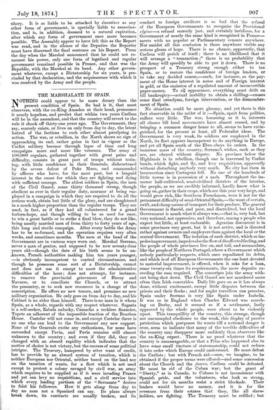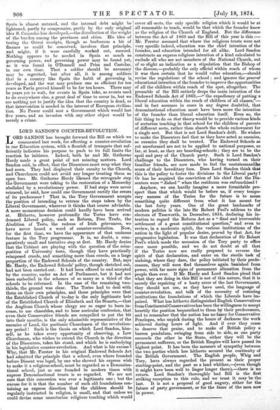THE MARSHALATE IN' SPAIN.
OTHING could appear to be more dreary than the IN present condition of Spain. So bad is it, that most observers, with the ex-King Amadeo at their head, pronounce it nearly hopeless, and predict that within two years Carlism will be in the ascendant, and that the country will revert to the rule it shook off thirty-one years ago. The Government, they say, scarcely exists, or lives on only from day to day, the latent hatred of the factions to each other almost paralysing its action. The war, or rebellion, in the North shows no sign of approaching its end, rather gains in fact in vigour as the Carlist soldiery become through lapse of time and long campaigns more and more like veterans. The army of 100,000 regulars, gathered together with great pains and difficulty, consists in great part of troops without train- ing, with little confidence in their Generals, disheartened by the severe defeat of Pella Muro, and commanded by officers who have, for the most part, but a languid interest in the cause for which they are fighting and dying with sufficient courage. The ablest soldiers in Spain, the men of the Civil Guard, some thirty thousand strong, though obedient as ever in their regular duty, murmur at being em- ployed in a campaign in which they are required to do all the serious work, obtain but little of the glory, and are slaughtered in a much higher proportion than the regular troops. They are used, in fact, as if they had all volunteered for a grand forlorn-hope, and though willing to be so used for once, to win a great battle or to strike a final blow, they do not like, being mostly married men of from- thirty to forty years of age, this long and sterile campaign. After every battle the Army has to be re-formed, and the operation requires very often weeks, and sometimes months. The men at the head of the Government are in various ways worn out. Marshal Serrano, never a man of genius, and supposed to be now seventy-four years old—though the date of his birth seems to be an- ..known, French authorities making him ten years younger, —is obviously incompetent to control circumstances, and though he possesses some sort of a Dictatorship, cannot and does not use it except to meet the administrative difficulties of the hour; does not attempt, for instance, to remove the provincial grievances of Biscay and Navarre, or to conciliate the Church, or to attract the peasantry, or to seek new resources in a change of the conscription. He offers no new tenure, and promises no new military organisation. He only goes on from day to day, and his Cabinet is no abler than himself. There is no man in it whom Spain, as a whole, regards with any respect whatever. Sagasta is a self-seeker, Zabala unlucky, Camacho a reckless financier, Topete an adherent of the impossible fraction of the Bourbon House. Castelar will not come in, and except Castelar there is no one who can lend to the Government any new support. None of the Generals excite any enthusiasm, for none have succeeded except Pavia, and Pavia remains still almost unknown to the country ; andY even if they did, they are changed with an absurd rapidity which indicates that the motive of choice is not victory, but the success of some political intrigue. The Treasury, hampered by utter want of credit, has to provide by an absurd system of taxation, which is neither European nor Oriental,, neither based on the. land nor on the taxation of wants, for a fleet which is not used except to protect a colony ravaged by civil war, an army which requires to be supplied as if it were invading France and yet can levy no requisitions, and a civil service into which every leading partisan of the- " Serranate " desires to foist his followers. How it gets along from day to day no man not a Spaniard can say. Its plans always break down, its contracts are usually broken, and its
I conduct to foreign creditors is so bad that the refusal ' of the European Governments to recognise the Provisional I regime—a refusal scarcely just, and certainly invidious, for a Government of nearly the same kind is recognised in France— meets with no popular or Parliamentary censure anywhere. Nor amidst all this confusion is there anywhere visible any serious gleam of hope. There is no chance, apparently, that Carlism will perish of itself ; there is no likelihood that it will arrange a " transaction ;" there is no probability that the Army will speedily be able to put it down. There is no prospect of a Treasury strong enough either to tax Spain, or to restore the confidence of foreign lenders, or to take any decided course,—such, for instance, as the pay- ment of the Home interest in notes and of Foreign interest in gold, or the emission of a regulated amount of inconvertible paper-money. To all appearance, everything must drift on till bankruptcy—actual inability to obtain a shilling—causes some final cataclysm, foreign intervention, or the dismember; ment of Spain.
No situation could be more gloomy, and yet there is this fact observable in the midst of it :—Spain, apart from politics, suffers very little. The war, harassing as it is, interests all classes till local movements have almost ceased, and by bringing a common danger home to all, seems to have extin- guished, for the present at least, all Federalist ideas. The Government is very weak, its soldiers are employed in the North, its fleet appears incompetent to do anything in Europe, and yet all Spain south of the Ebro obeys its orders. In the immense mass of the country, Serrano's wishes, such as they are, are obeyed without dispute. No province below the Highlands is in rebellion, though one is traversed by Carlist bands, which fight, and fly, and levy requisitions, apparently without disturbing anybody very much. No city has risen in insurrection since Cartagena fell. No one of the hundreds of little towns is in possession of a mob. Throughout the im- mense half-cultivated, semi-civilised districts of the interior, the people, as we are credibly informed, hardly know what is going on, gather in their crops, which are this year very large, and would grow rich, like Southern Frenchmen, were it not for the permanent difficulty of semi-Oriental Spain,—the want of certain, swift, and cheap means of transport for their produce. The general Government is flaccid, and poor, and discredited, but the local Government is much what it always was,—that is very bad, but very national, not oppressive, and therefore, among a people who expect but little, at least endurable. Agrarian discontent is in some provinces very great, but it is not active, and is directed rather against owners and employers than against the local or the central Government. The isolation of each district, which so im- pedes improvement, impedes also the flow of disaffected feeling, and the people of whole provinces live on, and toil, and accumulate, like the people of Northern Portugal,where a Government which nobody particularly respects, which once repudiated its debts, and which is of all European Governments the one least devoted to material improvement, is offered, when it asks for a loan, some twenty-six times its requirements, the mere deposits ex- ceeding the sum required. The conscripts join the army with- out being shot down. The Civil Guard are not murdered more often than Irish constables Daily life goes on as it has always done, without excitement, except little disputes between the priests and their flocks ; and for aught travellers can perceive, Spain under Serrano is very like Spain under Isabella. It was so in England when Charles Edward was march- ing on Derby, and it seemed as if a settlement, lazily approved by the whole people, were about to be violently upset. This tranquillity of the country, this strange, though not unexampled obedience to the weak, this display of passive patriotism which postpones its wants till a national danger is over, seem to indicate that many of the terrible difficulties ot the country may disappear more suddenly than observers like the ex-King expect. There is no proof whatever that the country is unmanageable, or that a Prim who happened also to have some small tincture of statesmanship, could not reduce, it into order which Europe could understand. Ile must defeat the Carlists ; but with French aid—sure, we imagine, to be
obtained if the proper terms were offered—and some concession
about the Church and the fueros, Carlism could be defeated. He must be rid of the Cuban war; but the grant of "liberty," as in Canada, to Cubans is not inconsistent with
Spanish pride, and the volunteers, who look so strong, could not for six months resist a strict blockade. Their leaders would have no money, and it is for the
revenues from their estates, that they, like all slave= holders, are fighting. The Treasury must be refilled ; but
Spain is almost untaxed, and the internal debt might be lightened, partly by compromise, partly by the only original idea S. Camacho has developed,—the distribution of the weight of the burden among the provinces and cities. His idea of taxing the Octroi receipts, though as barbarous a bit of finance as could be conceived, involves that principle, and might, if it were carefully worked out, succeed. Nothing appears to be needed in Spain so much as governing power, and governing power may be found yet, as it was found in O'Donnell and Prim and Castelar, in our own time. That a soldier should be necessary may be regretted, but after all, it is among soldiers that in a country like Spain the habit of governing ik developed, and the war may produce one as efficient for ten years as Pavia proved himself to be for ten hours. There may be years yet to wait, for events in Spain take, as events used to do everywhere else, a great deal of time to occur in, but we see nothing yet to justify the idea that the country is dead, or that intervention is needed in the interest of European civilisa- tion. No Power could seat a Government which would last five years, and an invasion with any other object would be merely a crime.



































 Previous page
Previous page